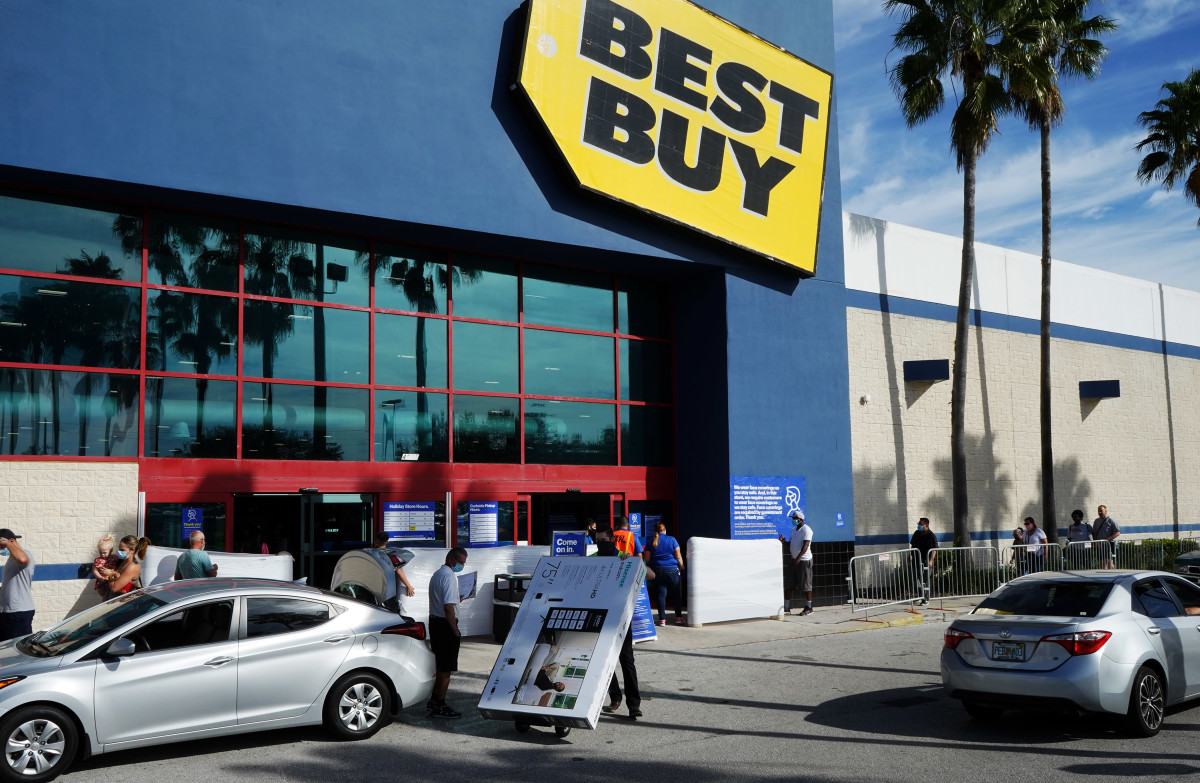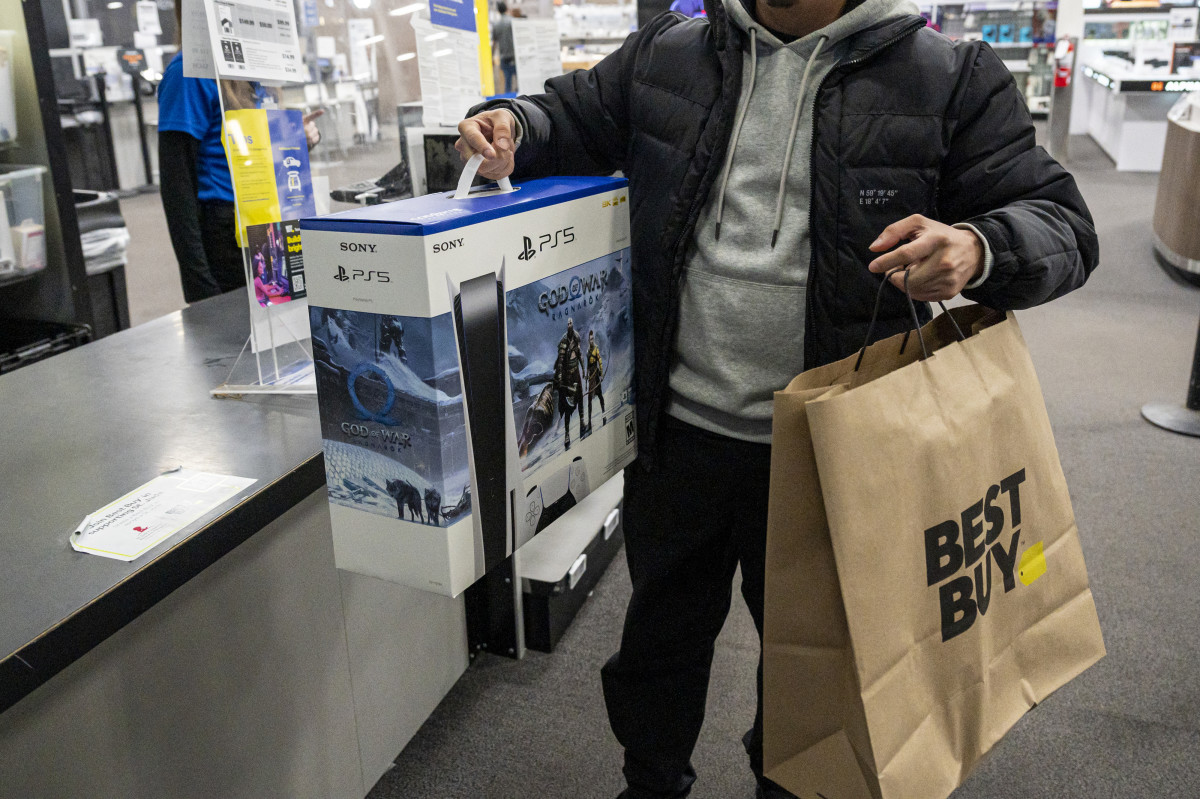
When you walk into a Best Buy (BBY) store, it's hard not to get flashbacks of a nostalgic early 2000s era that was once all about DVDs, CDs, mp3 players and video games.
Best Buy was the lead electronics retailer during that period, but over the years, its magic has gradually waned as consumer interests have steered more toward online entertainment, which has slowly eaten away at the company’s profits.
🚨 Don’t miss this amazing Black Friday Move! Get 50% off TheStreet Pro. Act now before it’s gone.😲
Now, as Best Buy struggles to maintain relevance, it is calling out another concerning consumer trend that has caused it to face a dip in its sales recently.
Related: Target hopes to win back shoppers with generous Black Friday deals
In its third-quarter earnings report for fiscal 2025, released Nov. 26, the company reported that its U.S. comparable sales declined by almost 3% year over year. Sales for consumer electronics fell almost 6%, appliance sales slid by roughly 15%, and entertainment sales decreased by about 19%.
The weaker sales contributed to Best Buy's roughly 3% year-over-year decrease in U.S. revenue during the quarter. The company’s poor performance also prompted it to lower its sales expectations for the fiscal year, which ends in January 2025.

“We are adjusting our full-year comparable sales guidance to a decline in the range of 2.5% to 3.5%,” said Best Buy Chief Financial Officer Matt Bilunas in the earnings report.
The shares fell 4.8% to $88.48 after the earnings report came out. But the shares recovered to $90 by the end of the week. They're up 15% in 2024.
Best Buy calls out the source of the problem
During the company's Nov. 26 earnings call, Best Buy CEO Corie Barry revealed that customers have reduced their spending more than previously expected during September and October.
“We attribute this to a combination of overall ongoing macro uncertainty, customers waiting for deals and sales, and distraction during the run-up to the election, particularly in nonessential categories,” said Barry. “We expected lower demand between sales events, but the impact was even steeper than we estimated.”
Related: Lowe’s sounds alarm bells around a growing problem
Consumers nationwide have been feeling an extra strain on their wallets lately. In October, the Consumer Price Index, which measures the average change in the prices consumers pay for goods and services, increased by 0.2%, increasing the inflation rate to 2.6% year over year.
Also, over the past few months, consumers have been facing the stress of the buildup toward the Nov. 5 presidential election. Republican candidate former President Donald Trump won the election over Vice President Kamala Harris.
Best Buy unveils new plan to boost sales
Amid these recent challenges, Barry claims that Best Buy customers “remain deal-focused and attracted to more predictable sales moments.”
As a result of this recent behavior, Best Buy is ramping up the number of deals it offers to customers that range “across a wide range of price points.” The retailer even kicked off its Black Friday sale on Nov. 21, which is a week earlier than when it started last year.

Best Buy also recently announced the return of its Doorbuster deals which now drop every Friday between Nov. 8 and Dec. 20 in stores and online.
“It's early in the holiday season, but we are encouraged by how our Doorbuster and other Black Friday sales are resonating with customers thus far,” said Barry during the call. “In fact, our enterprise comparable sales for the first three weeks of November are up approximately 5% over last year.”
Best Buy CEO gives a stern warning about future prices
While Best Buy rolls out deals to attract customers back into its stores, it did, however, warn that its prices may soon increase in the future as a result of Trump’s tariff proposal.
Related: Target flags startling customer behavior ahead of holidays
Trump is proposing to impose tariffs of 60% to 100% on all goods coming from China, 25% on all goods coming from Mexico and Canada, and 10% to 20% on goods imported from all other countries.
More Retail:
- PepsiCo’s plan to buy a popular brand draws threats from consumers
- Target makes bold clarification to return policy amid alarming trend
- H&M is the latest victim of an alarming shift in consumer behavior
Best Buy claims that these tariffs could have a major domino effect on its business since 60% of its goods come from China, and its second-largest import country is Mexico.
“I think it's going to be a very fluid situation as we continue to work through it,” said Barry during the earnings call. “Typically, in history, this ends up being some kind of costs that are shared. To some extent, the vendors have some. To some extent, Best Buy. But, of course, we see that the customer ends up bearing some of the cost of tariffs, and we've seen this before. And for us, that's the hardest part. These are goods that people need, and higher prices are not helpful.”
Related: Veteran fund manager sees world of pain coming for stocks







